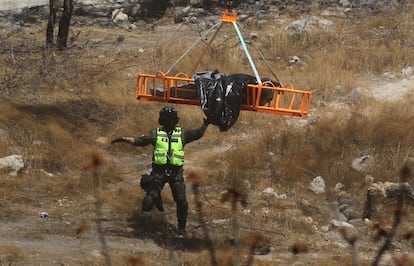Bodies found in Guadalajara ravine confirmed to be missing Jalisco call center workers
Forensic evidence appears to confirm the remains found in the Barranca de Huentitán belong to the young people who worked at a company allegedly acting as a front for the Jalisco New Generation Cartel


Mexican authorities have confirmed that the dismembered bodies found at the bottom of a ravine north of Guadalajara belong to some of the young men who began disappearing on May 22 after going to work at a call center in Zapopan. The company that operated the office is being investigated for allegedly being a front for a scam in the hands of the Jalisco New Generation Cartel (CJNG), which swindled American tourists in the sale of vacation apartments in popular destinations like Puerto Vallarta.
The communiqué issued by the Jalisco state government does not provide a great deal of information. Forensic tests carried out on the bodies, which were found a week ago, confirm that they “belong to the young men who worked in an operations center in Zapopan,” but the names and the number of missing persons to which they refer are not specified. In principle, by referring to “the young men,” it can be inferred that the bodies of the call center workers who were declared missing in connection with the case were discovered, but the Prosecutor’s Office did not respond to a request for information from this newspaper.
On May 20, the disappearance of Carlos Benjamin Cuevas would prove to be just the beginning of a case that resulted in the disappearance and death of the six young men and a woman who, as far as their families were concerned, worked in an ordinary call center where they sold vacation stays to foreign tourists. Two days later, the brothers Itzel Abigail and Carlos David were declared missing. Then followed Arturo Robles, Jesús Alfredo Salazar, Mayra Karina and Jorge Velázquez. Most of them were no more than 30 years old. The culprits are still at large, although all the clues point to the CJNG, which is heavily involved in the organized crime network dedicated to scamming tourists, the majority of whom are U.S. citizens.
On May 31, agents of the Attorney General’s Office found human remains during an operation in the Barranca de Huentitán, west of Guadalajara, a remote canyon and protected area outside the small municipality of Santa Cecilia. Dozens of officials from the Jalisco Institute of Forensic Sciences, the Prosecutor’s Office and the Secretariat of Security and Civilian Protection participated in the search. Up to 50 human body parts were discovered and removed in black bags for identification. Preliminary analyses indicated that they belonged to the call center workers, due to anatomical similarities between the missing people and the bodies found, and this was officially confirmed on June 7.
Authorities suspect the involvement of a criminal enterprise connected to the CJNG. Rosa Icela Rodríguez, head of the Secretariat of Security and Civil Protection, said that the evidence pointed to “some type of real estate fraud and some type of telephone extortion.” The Jalisco state prosecutor, Luis Joaquín Méndez, confirmed that one of the lines of investigation is that the alleged call center was offering time-shares to foreign tourists.
Sign up for our weekly newsletter to get more English-language news coverage from EL PAÍS USA Edition
Tu suscripción se está usando en otro dispositivo
¿Quieres añadir otro usuario a tu suscripción?
Si continúas leyendo en este dispositivo, no se podrá leer en el otro.
FlechaTu suscripción se está usando en otro dispositivo y solo puedes acceder a EL PAÍS desde un dispositivo a la vez.
Si quieres compartir tu cuenta, cambia tu suscripción a la modalidad Premium, así podrás añadir otro usuario. Cada uno accederá con su propia cuenta de email, lo que os permitirá personalizar vuestra experiencia en EL PAÍS.
¿Tienes una suscripción de empresa? Accede aquí para contratar más cuentas.
En el caso de no saber quién está usando tu cuenta, te recomendamos cambiar tu contraseña aquí.
Si decides continuar compartiendo tu cuenta, este mensaje se mostrará en tu dispositivo y en el de la otra persona que está usando tu cuenta de forma indefinida, afectando a tu experiencia de lectura. Puedes consultar aquí los términos y condiciones de la suscripción digital.








































